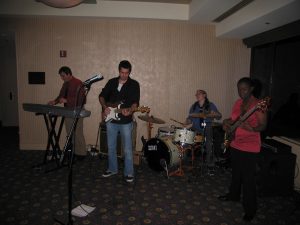I originally wrote this article in 2002, in a frenzy of inspiration when still smarting from the emotional pain of parting ways with a band I had put years into. Since then, I have played in several groups, and have always had positive experiences with them during the time we were together.
The information here is still relevant, and thus I share it with you now.
On Being in a Band

Music is a rather unique art form in that it can be an unstructured, collaborative process. Writing, poetry, painting, and sculpture are solo arts, in which the artist succeeds or fails based on their decisions alone. Group art such as theatre, dance, and filmmaking tend to have a codified structure, where an individual is responsible for the primary idea, someone else is responsible for interpreting that idea, and everyone else inputs their creativity in a rather rigid, narrowly defined way.
All music beyond a solo act demands cooperation and collaboration between the players. When money is involved, it is possible to have the same type of hierarchy that makes a theatrical or film production work: all the players are following the instructions of a leader, because they are making their living at it. It is a paid gig, so there is less ego involved. But what of the far more common example of a band that is together of their own free will, rehearsing, composing, and performing together with little or no financial renumeration? How do you make it work and keep it working? How do you know when it is not working, when it is headed for a change or the end of the road? How do you know when to leave the situation?
I’ve been in and out of bands continuously since I was 18 – for more than half of my life now. I have composed, rehearsed, recorded, gigged, lugged tons of heavy equipment, spent my last dime on gear, tape, and CD duplication. I’ve created band websites, designed band logos, and sacrificed unbelievable amounts of time and energy to the cause. I’ve screwed up love relationships, and endured (and inflicted) pain from and among bandmates “for the good of the band”. I’ve sat in cars, burning up the miles from Moscow, Idaho to Missoula, Montana, only to get chewed out by the owner of the next club that we didn’t have a big enough draw. I’ve sat in crappy clubs with a bad case of bronchitis, forcing myself to play a three hour set while wishing I was dead. I’ve had countless vindictive and utterly useless email and phone discussions about this band member or that one’s personal or musical failings. I’ve cried, lost sleep, and been utterly furious. I’ve also enjoyed countless moments of ecstacy: Opening the box of CD’s coming hot off the press from the manufacturer, playing gigs to packed audiences at venues I had only dreamed of, having strangers come up and say how much they love our music.

To quote George Harrison, “With every mistake, we must surely be learning”. Here are some principles that might help you evaluate your band experience:
All Things Must Pass
“Don’t hang on – Nothing lasts forever but the earth and sky”
I hate to break it to you, but I guarantee that your band will break up. As death is the inexorable conclusion of life, so too, your band’s end is built in to your band’s beginning (sometimes, you will leave and the band will change, but it will eventually end with or without you). The reasons are legion, but primarily have to do with changes in circumstance or perspective that mean that the bandmates are no longer in sync. Or sometimes you just get sick of being with each other in such a tight-knit situation. The best way to armor yourself against this inevitability is to bear it in mind from the beginning. Remember, all the great bands have broken up: The Beatles, The Who, REO Speedwagon. This is not to say that you should live fatalistically, but put it in the proper perspective, think of it as “a project” rather than your life, and be sure to make charts of songs that you want to keep for your next project, so that the new musicians you work with can learn them quickly. There are always more fish in the sea.
Are Your Lifestyles in Sync?
People come into bands from all walks of life, and all backgrounds. The hard truth of the matter is that lots of musicians have drinking or drug habits. Some of them have drinking and drug problems. In my experience, a clear warning sign is if they do it every day, or every rehearsal, or every gig, it is a habit or a problem. If the use of drugs or alcohol has a significant impact on the musician’s life, money, or other relationships, it is definitely a problem.
My personal take on the matter is that exploration of alternative awareness, through alcohol, pot, hallucinogens and the like, is a natural part of growing up. As we are in our teenage years and early twenties, we are defining our personalities, exploring our boundaries, trying to figure out how life works in a meaningful way. And there is no question that things like pot and LSD were enormously influential in the creation of some of the greatest works in rock and jazz. There came a point in my journey, though, when I realized that even occasional casual use was affecting my musicianship (and maturity) negatively. In order to improve my rhythmic sense, and strengthen the bond between my rational and intuitive processes during improvisation, I gave it up completely. This was a personal choice, and I’ve never looked back.
In this respect, the band’s group lifestyle dynamic absolutely needs to be in sync. If some members of a band a straight and some are high, you have a recipe for tension in the group dynamic.

Are Your Goals in Sync?
Bands are timesinks. There is no getting around it. The only question is how much of your time and energy you are willing to give. The amount will strongly determine the possible end goals of the band. At the beginning of the band, you should make sure that everyone has similar or identical goals for the group, and a realistic assessment of whether they have the necessary time, energy, and desire to attempt to reach those goals. As the band progresses, you need to continuously re-evaluate everyone’s goal desires and their ability to commit the time to achieve those goals.
The first step is to commit to the number of rehearsals per week, and the number of desired gigs per month. One rehearsal per week is a bare minimum to make anything happen, and anything more than three is a recipe for killing each other. Likewise, 1 gig per month is a good minimum number to shoot for, but if you are getting up towards 2 gigs per week, or contemplating touring, you need to make sure everyone is still on board. Bands have a nasty habit of taking you away from family and career, so be sure to check it as you go along to make sure that you have not given up more of your life than you feel comfortable.
If some people in a band are intent on “making it” while others just want to have a good time making music and having fun, you are dead in the water. The gung ho members will continuously resent the lack of commitment on the part of the casual guys, and the casuals will similarly resent the endless impinging on their lives for band duties.
Are Your Musical Interests in Sync?
Eclecticism is a wonderful force in music. The fusion of different musical interests and styles can create all sorts of new flavors and energy. But when unfocused or unclear, it simply leads to musical car wrecks. I have experienced a situation with a rock drummer, a funk bass player, a prog rock sax player, a dissonant with lots of pedals going all at once guitarist, and me as a funk jazz Hammond player. Nobody was “wrong”, of course – but the individual styles and lack of agreed upon band direction led to tension, dissatisfaction, and watered-down musical statements. When starting a band, having a musical focus is critical. It is the touchstone upon which you can rest to add players who are willing to play within that style.
Another force that keeps music vital is the inevitable change in tastes and direction over time. Over my musical career, I have been fascinated by (in chronological order): 60’s Brit Pop (The Beatles), New Wave (Howard Jones, the Human League), Middle of the Road American Rock (Springsteen et al), 70’s Progressive Rock (Genesis, ELP, Yes), ambient synth music (Tangerine Dream), 20th C Avant Garde (Terry Riley, Pauline Oliveros, et al), Experimental Electronic music (Pierre Henry, Luc Ferrari, et al), group improvisational rock (Grateful Dead, Phish, et al), jazz rock (Bruce Hornsby), funk and soul jazz (Herbie Hancock, Jimmy Smith) and, finally, jazz (Miles, Bird, Coltrane, Bill Evans). It is perfectly natural to grow and change musically. But if you are moving into new terrain and other folks in the band are similarly exploring their divergent directions, it is time to find new players better suited to what you are interested in.
Are Your Musical Abilities in Sync?
Realistic appraisal of where you are technically as a musician is a difficult thing to confront. The honest truth is that talent can get you a long way, but there is no substitute for musical training and good, hard woodshedding. Every great musician has been through a long period where they were not. But careful dedication to the craft got them where they are.
Groups seem to work best when everyone is of approximately equal musical ability. There is nothing more frustrating (on either side) than for one musician to present a chart with jazz chords changing at every measure, while another member of the group does not know how to play a Bb major scale on their instrument. Experience has shown me that everyone in a group should be able to read a simple chart presented by a composer – it makes the rehearsal and learning process much faster and more productive. Having to teach melodies and chord progressions by ear is slow and painful.
When confronting this question, try to put your defenses aside and appraise the musical abilities of each member of the group dispassionately. If you are more advanced than everyone else, consider finding other musicians at your level. You will waste time trying to get them to your level. If you are less advanced than everyone else, either take the time to really apply yourself to individual practice and learning, or get out while the getting is good. If most people in the group are of the same level but one person is the weakest link, you have a tough situation that needs to be handled honestly but delicately.
Screening new players carefully is paramount in trying to balance everyone’s ability. In putting together projects, I now make sure that potential players can read music, have at least some formal musical training and a minimum of 5 years band experience, before even bothering to audition them. It saves everyone time and headaches.

Are Your Demographics in Sync?
I think that the best bands come from people in roughly the same age ranges, and from roughly similar walks of life. I say this only because I think it makes it easier to have stuff in common to chat about during the incredibly long periods of time you spend together while not making music. To be sure, the language of music is universal and can be discussed across all boundaries. But a 40 year old spandex wearing rock guitarist just doesn’t make it with a 18-year old punk band. On the other hand, once you get to a certain age, you can play with cats until they drop. As a 37-year old, it is now great for me to play with jazz cats who were playing when I was in diapers. I am really learning from their years of experience.
If you are 35 and Still Trying to “Make It”, Check your Priorities
OK, time for more bad news. One band out of one thousand (or less) actually makes a living at playing original music. Now, of every band you can think of that is making it or has made it, how old were the musicians when the band became big? The Beatles? About 20. The Who? The Stones? Jimi Hendrix? Counting Crows? Primus? The Police? All between late teens and 25. I’m sorry to have to break it to you, but if the mean age of your band is mid-thirties, you will not make it as a rock, alternative, or pop band. You just won’t. First of all, you are writing and playing music for an audience that is 15 years younger than you. Second of all, you are out of touch with them on a cultural and musical level. Third of all, you are no longer as young, handsome, and sexy as you once were.
Now for the good news. With age comes wisdom. And often, the means to move your life along and grow. If you’ve had a great run playing music through your teens and twenties, terrific. There is no reason you have to stop in your thirties, forties, or eighties. But get realistic about what the career cash potential is, and look in other directions for your daily bread. Also, the great thing about your thirties is that you are in the right place maturity-wise to partner down and enjoy the wonders that being a husband, father, or domestic partner can bring. You can still be a weekend warrior – it would be unfair for a partner to deny you your musical life. But to be out on the road all the time, and not at least sending home a fat paycheck is selfish, irresponsible, and the stuff divorce is made of.
The day I decided to marry was the day my priorities changed. My band was no longer number one on my hit parade. Not even number two. The clouds parted, and it was perfectly clear that my wife came first by a mile. Then my career. And then, running a distant third in the hobby department, came my band. These kinds of shifting priorities can spell big trouble for the group if other members are still gung ho to make it their vocation. If that is the case, you owe it to yourself, your partner, and them, to step aside and let them continue their pursuit.
Band Democracies Don’t Work
It was Winston Churchill who said that “democracies are the worst form of government except for all the others”. If he had been chomping his cigar in a local blues band, he might have rethought his perspective a bit.
On paper, it would seem that a completely democratic form of leadership would be the best way to run a band. After all, everyone gets an equal say, each person gets their thoughts heard, and all needs are met. Right? Wrong. Here is the problem: because we are talking about aesthetic decisions, different members are guaranteed to have wildly different opinions. Having votes about absolutely every decision to be made gums up the works considerably. An incredible amount of time gets spent discussing details, and the energy that could be put to use creating posters, writing material, or rehearsing gets piddled away in meetings. If it were just these meetings that took up time and energy, though, it would not be so bad. The problem is actually far more insidious and divisive than that: In any social group, there will be people that handle getting their way in different ways. In a situation where votes count, people who really want to get their way will bargain with, curry favor from, and otherwise exploit other band members behind the scenes to try to get decisions to come out in their favor. This type of back room politics and Machiavellian manipulation is perhaps the most damaging form of trust destruction I have ever witnessed in a band. It goes hand in hand with the sniping and backbiting discussed earlier, and is the most thorough way I know to turn trusted comrades and long time friends into people who are permanently done with each other.

Band Dictatorships Don’t Work
So if democracy does not work in a band situation, let’s take a look at the other tried and true method of band governance: dictatorship. In this form of band, one strong person takes the helm and guides the boat. They are the final arbiter of all decisions musical and not. They choose the material, schedule the rehearsals, book the gigs, handle the money, come up with the band name (usually “The Joe Smith Band”, “The Bob Jones Quartet”, et al), and do just about everything except play the other member’s instruments. If the band is playing casuals, or the band leader is, oh, Sting, Peter Gabriel or Donald Fagen, this type of situation works out just fine: everybody knows exactly where they stand, and the sidemen walk away from the gig with a nice paycheck, no harm, no foul. But what if we are talking about the much more common scenario of an original band playing lousy clubs and dive bars? How does the band leader motivate and hold the interest of the other musicians in the group? What is causing them to show up to rehearsal promptly and reliably? What makes them take time away from their loved ones if they don’t even get a much of a say in what goes on musically?
I don’t have an answer here, because I have never seen this type of situation last unless money was involved. My only advice is this: if you want to be a band leader of this type, get many copies of charts and tapes of your material ready, because you are going to have a high turnover of musicians. Have a thick skin, handle rejection well (hey, if you are in an original band, you already have lots of experience with rejection), and stay focused on your vision. You might just find the easy-going cats who are looking for a simple gig where they just have to show up for the rehearsals and gigs and do absolutely nothing else. But don’t expect them to then throw their backs into postering and otherwise pushing the band, because it just won’t happen.
So with both democratic and dictatorial forms of band leadership shown to have enormous problems in the long term, what is the most successful form of leadership for an original project? I would say either one that involved renumeration to the musicians, or one with a short time horizon, focused on fun rather than success.
R E S P E C T
I promise not to continue going on like a self-help infomercial. But if there is one element I find crucial to the band process, it is unconditional, mutual respect. I cannot stress this enough. Let the others in your band know that you respect them musically and personally. Expect and demand exactly the same treatment back from them. If you take shortcuts here, if you rely on friendship to smooth out any inherent lack of respect, your relationships will degrade and trust will suffer. Earlier in my band career, I thought that pushiness and aggressive musical behavior would get me the desired musical result. In retrospect, I see that this lack of respect engendered a similar lack of respect back, and the band eventually failed. Later on, I found that similar tactics were used against me, and it made me utterly furious. Respect your bandmates, make them respect you. Even if it means having a slightly more formal relationship with people you are close to.
One more word on respect: I have been in the situation where a bandmate has used our musical relationship to attack me personally: the way I dressed, the way I spoke, etc. If this ever comes up, cut it off at the knees. It is strongly outside of the boundaries of musical critique, and is disrespect of the highest order. Nip it in the bud, instantly and with firm resolve. If you would not put up with that type of treatment from your friends, never put up with it from your bandmates. Nobody likes a bully.

Do It For Yourself
Here is another mistake I have made that you don’t have to: Never, ever, ever stay in a band for the supposed benefit of other members. If you want to go, if there are too many things out of sync as mentioned above, if it is time to move on, by all means do so. I have wasted a good three musical years sticking around bogus situations after I wanted to leave, because I thought it would help the other members. This line of thinking is egocentric and doesn’t do anyone any good. It just prolongs your agony. Believe me, if they want to continue their group, they will find another musician, and you can move on to other pastures, guilt-free.
Glass Cathedrals and Howitzers
We’ve all heard the dictum “people in glass houses shouldn’t throw stones”. I have had a toxic band experience where virtually everyone sniped incessantly behind the backs of others about each and every fault, real and perceived, both musical and personal. There was so much time spent going on endlessly about what bad people/musicians/whatever that the other musicians were that all positive energy in the band dissipated and blew away on the wind (and yes, you can bet that I contributed to this crap). Do yourself and your bandmates a favor. Follow the Buddhist principle of right speech (put simply, don’t say mean shit about others). The next time you are starting on a tirade about how your drummer can’t groove, put that energy toward analyzing where you can improve musically instead. I promise you that unless you are Dennis Chambers, Joey DeFrancesco, John Coltrane, Paul McCartney, or Jaco Pastorius, you have room for plenty of musical growth. The next time you start in on what an inflexible, arrogant prick your bass player is, think instead about the last time you said something mean or unwarranted instead. Unless you are Mahatma Gandhi, Mother Theresa, or Martin Luther King Jr, you have plenty of room for personal growth.
Going into Business with the Wrong People
In closing, I’d like to quote a dear friend and consummate musician who founded a successful gigging band, only to have it explode, destroying 20 year relationships along with it: Bands can’t work, because having a band is going into business with a bunch of people. And the people you have in a band you would never, ever go into business with.
All of these musings might sound pretty cynical, and the truth is that they are. But they come from hard fought experience. Bands can be extremely intense emotional experiences. They can challenge you to play your best, to do things you never thought of before, to rise to new musical heights and to bask in the glory of a cheering crowd. And they can also rake your psyche over the tortured coals of your bandmates’ personal hells. I hope that this treatise does not sound simply like sour grapes: I have learned, grown, and made great music with the bands I have led and been in over the years. But at times, the music has come at great personal cost. And to be clear, I have personally made every mistake in the book. In thinking this all out, however, I have developed some new strategies to help make future projects smoother, maximizing the music and the fun, while minimizing the nonsense. And so far, they are working well. I hope some of these principles help you out too.
Nick Peck
May 31, 2002
Kihei, Maui, Hawaii

 I’m in the process of posting my albums and miscellaneous compositions to SoundCloud. They are all available for listening through the
I’m in the process of posting my albums and miscellaneous compositions to SoundCloud. They are all available for listening through the